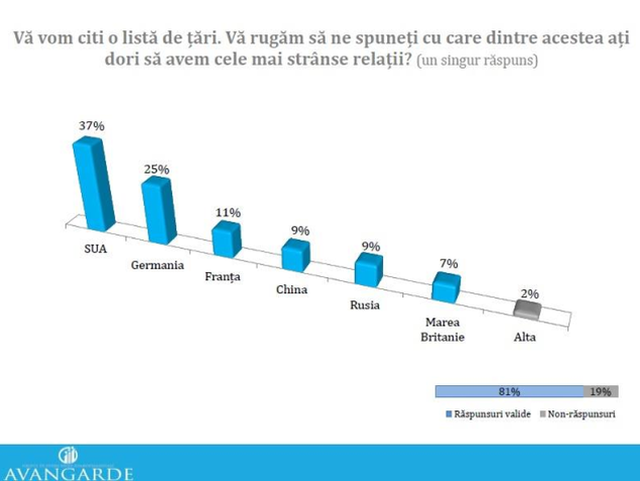Romanians’ opinions on their allies
Recent studies show that Romanians hold in high esteem the countrys partnerships with big Western democracies and express reluctance regarding Russia

Bogdan Matei, 29.10.2018, 13:40
Whereas at domestic level Romanians’ political preferences vary, sometimes quite dramatically from one election cycle to another, their foreign policy options are much more stable. Thus Romanians remain strictly attached to the country’s alliances and partnerships with the main champions of democratic values in Europe and the world.
Three quarters of Romanians say the United States should remain the country’s top strategic partner, according to the findings of a recent survey conducted this month by the Avangarde Group of Social and Behavioral Studies, with an error margin of 3.2%. Another three Western democracies followed the United States of America: Germany, with 45% of respondents’ choice, France with 29% and Great Britain with 16%. Additionally, over 37% of respondents want Romania to have closer relations with the United States, 25% with Germany while 11% with France.
The study also reveals that nearly 60% of Romanians say the US anti-ballistic missile shield in Deveselu, southern Romania, is a good thing, while 20% say it’s a bad thing. As regards the foreign military presence on Romanian soil, 33% of respondents said NATO should increase the number of troops deployed to Romania, over a half say it should stay the same, while 14% believe the US should have fewer soldiers in Romania.
According to the survey, 45% of respondents argued in favor of improving relations with Moscow, 24% say Romania should distance itself from Russia, while 31% believe Russia is Romania’s fiercest enemy. Analysts say the explanations for these idiosyncrasies are rooted both in the past as well as in the present.
On the one hand, Romania’s treasure sent to Tsarist Russia for safe-keeping during the Great War, has never been returned by Moscow, as well as the annexation of the Romanian eastern territories in 1940 by the USSR, followed by the instatement of communist rule in 1945, are very telling of the respondents’ choice. The study also points out that 87% of respondents want the new US ambassador to Bucharest to continue to support the National Anticorruption Directorate’s crusade against corrupt politicians.
“Romanians focus on the corruption of the political class and the fight against corruption ranks high on the public agenda. US support in this respect is well received amongst Romanians”, sociologist Marius Pieleanu, the director of the Avangarde Group of Social and Behavioral Studies concluded.






























